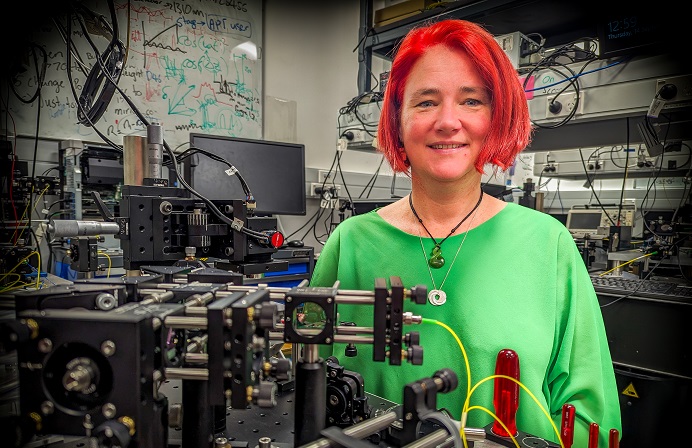
As the world braces for a second quantum revolution, New Zealand stands at the forefront of this global shift, thanks to the groundbreaking work of the Dodd-Walls Centre for Photonic and Quantum Technologies.
Under the leadership of Professor Frédérique Vanholsbeeck, the Centre is not only pushing the boundaries of scientific research but also ensuring that the benefits of this technology reach all corners of society.
In this exclusive interview, Professor Vanholsbeeck shares insights into the Centre’s strategic vision, the challenges ahead, and the profound impact of its work on New Zealand and beyond.
Shaping the future of photonics and quantum technologies
At the helm of the Dodd-Walls Centre, Professor Vanholsbeeck plays a pivotal role in advancing photonics and quantum technology in New Zealand. The Centre, one of the country’s ten Centres of Research Excellence, brings together over 60 investigators, 100 students, and 40 to 50 research fellows.
“We’ve developed a comprehensive research programme focusing on photonics—the science of light – and its particles,” Vanholsbeeck explained.
This research excellence is complemented by partnerships with museums and an outreach team dedicated to engaging underserved communities, ensuring that the Centre’s work benefits a broad spectrum of society.
The Dodd-Walls Centre operates as an ecosystem, transitioning from fundamental science to real-world applications.
“Our good relationship with industry ensures that our research can be mobilised into products,” she said.
This collaborative approach, combined with the Centre’s robust outreach programs, is essential in shaping the future of photonics and quantum technologies.
Tackling real-world challenges through innovation
Photonics is a rapidly expanding industry in New Zealand, already valued at $1.5 billion and growing. The Dodd-Walls Centre plays a crucial role in driving this economic growth by focusing on key areas where photonics can have the most significant impact.
“Opportunities abound in sensing technologies, from detecting faults in the alpine mountains to identifying leaks in water systems,” Vanholsbeeck noted.
These low-cost, versatile sensors are particularly valuable in architecture and biomedical applications, offering point-of-care solutions that do not require heavy infrastructure.
As the world enters a second quantum revolution, the Centre is strategically positioned to leverage this shift. With the support of a $12 million Catalyst Fund, the Centre is exploring quantum computing, quantum communication, and quantum sensing.
“The big revolution with Quantum 2.0 lies not just in computing, but also in sensing and communication,” she explained.
“This holistic approach ensures that New Zealand remains competitive on the global stage.”
Impacts beyond economics: Wellbeing and collaboration
Beyond its economic contributions, the Dodd-Walls Centre is deeply committed to improving the well-being of all New Zealanders.
The Centre’s research has far-reaching implications for healthcare and environmental monitoring. For instance, ongoing projects include the development of a multimodal imaging platform to study cartilage degeneration – a project that has been in progress for six to seven years and brings together engineers, treatment practitioners, and imaging experts to slow down or prevent the breakdown of cartilage. It has been funded by a NZ Government Marsden grant.
Collaboration is, ultimately, at the heart of the Centre’s success.
“We constantly work to maintain and foster interdisciplinary collaborations,” Vanholsbeeck said.
This includes partnerships with sectors like AgTech (agricultural technology) and the Māori Economy, where the Centre is co-creating projects with Māori leaders to ensure that the benefits of photonics and quantum technologies are shared equitably across all communities.
Advancing diversity, equity, and inclusion in science
Professor Vanholsbeeck is also a passionate advocate for diversity and equity in science. Her efforts have significantly influenced the culture within the Department of Physics at the University of Auckland.
“We work hard to ensure all opportunities are open to everyone, especially those who may face barriers,” she said. This includes mentoring first-generation university students and making sure that support is available for those who need it.
Looking ahead, the Centre faces several challenges, including the need for ongoing engagement with Māori communities and maintaining a strong researcher base in the face of an evolving academic landscape.
However, Vanholsbeeck remains optimistic.
“If we don’t have a way to use, code, and implement quantum computers when they arrive, we risk falling behind,” she cautioned.
The professor nevertheless sees a bright future for photonics and quantum technologies in New Zealand, provided that frank discussions between scientists, industry leaders, and policymakers continue.
Inspiring the next generation of scientists
For young scientists interested in photonics and quantum technologies, Professor Vanholsbeeck offers sage advice: “Do it the way you like, whether you’re drawn to fundamental or applied science. If you are passionate, you will succeed.”
Her hope is that through the work of the Dodd-Walls Centre, more people will come to see photonics and quantum technology as fields they can study and contribute to.
As the Dodd-Walls Centre continues to push the boundaries of scientific research and innovation, it is clear that the legacy of Professor Vanholsbeeck’s leadership will be felt not just in New Zealand, but across the global scientific community.
Further insights on the work of the Dodd-Walls Centre:
- Commissioned Report: Value of the Photonic and Quantum Industry
- Website: Industry collaboration, membership opportunities, and more.
At this critical juncture for photonics and quantum technologies, the Dodd-Walls Centre, under the leadership of Professor Vanholsbeeck, stands as a beacon of innovation, collaboration, and societal impact.
The work being done today will not only shape the future of these fields but also contribute significantly to the well-being and economic prosperity of New Zealand.
